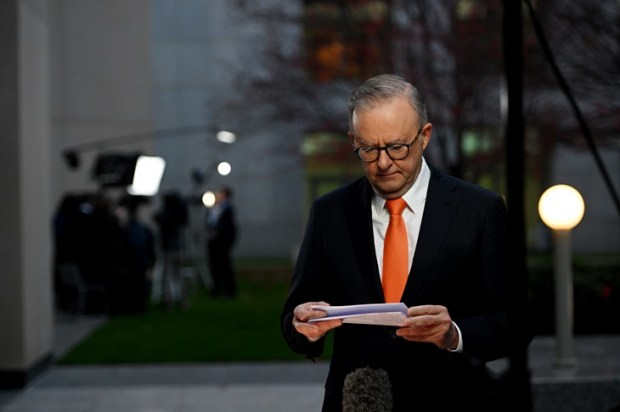I didn’t think this was possible, but even more indictments were levelled against Scott Morrison last week – something about him participating in a ‘secret government’… The only problem this time is that the allegations represent a non-issue. If all the facts have been presented, Scott Morrison, the Governor-General, Department of Prime Minister, and Cabinet all acted constitutionally and legally, albeit less conventionally. Surely the once-in-a-hundred-year pandemic required a more nuanced approach to government? The point being: although one wonders just how advantageous such secrecy was, there’s nothing of consequence here.
But, of course, the one to lob the criticism ‘secret government’ on last night’s 7:30 was no other than Morrison’s predecessor, whom I once described to another former Prime Minister as a ‘tyrannical demagogue’. Needless to say, my description was met with dry laughter.
Liberals, true Liberals, it’s time to wake the hell up.
After a long, fifty-year campaign, the barbarians are finally at the gates. They have many names and many more faces, but one thing’s for certain: if the walls are breached, they intend to show you no mercy. Oh, come on, don’t act so surprised. After all, you were the ones who facilitated their earliest skirmishes.
Let’s have a little bit of history. The Liberal Party of Australia, that masterful concoction of Robert Menzies, was launched in the twilight of the second world war. The party amalgamated fourteen anti-Labor movements to fight as a unified bloc against Curtin and Chifley’s socialism. A novel concept by today’s standards, I know.
Driving the Liberal Party were Menzies’ sage political philosophies. These were ideas that he accumulated and refined over several decades of public life. Take, for instance, this profound statement from his indomitable 1942 address, The Forgotten People:
‘I do not believe that the real life of this nation is to be found either in great luxury hotels and the petty gossip of so-called fashionable suburbs, or in the officialdom of the organised masses. It is to be found in the homes of people who are nameless and unadvertised, and who, whatever their individual religious conviction or dogma, see in their children their greatest contribution to the immortality of their race. The home is the foundation of sanity and sobriety; it is the indispensable condition of continuity; its health determines the health of society as a whole.’
Tell me, which embodies a greater sense of national identity: the elites in their North Shore mansions, who rouse only for the occasional cocktail reception, or the Queenslanders toiling out of Davenport Downs, who for virtually no acknowledgement ensure that metropolitan supermarkets remain stocked? Menzies was right; hardworking and often-rural families are the backbone of this nation. There’s a reason Australia’s greatest creatives – people like Patterson, Lawson, Namatjira, Streeton, and Sculthorpe – preoccupied themselves with the Outback.
For this critical demographic, which we do a damn poor job of looking out for, there is no better protection than Australia’s constitutional monarchy. The Crown empowers hardworking Australians by ensuring their freedoms are championed. It does not, however, empower the political class. It acts as an ultimate authority to curtail the ambitions of the elitists and the despotic.
Menzies knew all this. He understood that the Crown is a binding and defensive instrument that affords the liberties necessary to achieve national progress. In 1954, to commemorate the party’s tenth anniversary, he outlined seventeen fundamental tenets of the Liberal Party. The first of these, above all else, was the loyal proclamation: ‘We believe in the Crown as the enduring embodiment of our national unity and as the symbol of that other unity which exists between all the nations of the Commonwealth.’
Fast forward some twenty years to 1975. There’s rumoured to be a constitutional crisis brewing on the horizon. Liberal Malcolm Fraser makes the decision to politicise the Australian Senate, block supply to the Whitlam government, and demand that Sir John Kerr dismiss a sitting prime minister. Fraser might have prevailed politically, but he clearly had no regard for Menzies’ ideal of ‘continuity’. The dismissal led to the denigration of the Office of the Governor-General by way of Kerr’s utter vilification. In the 1980s, Labor perceived the Crown as being so fragile that it begun to openly entertain the notion of Australian republicanism, a notion which Fraser himself would later champion in a television commercial alongside – of all people – Gough Whitlam. Menzies, as a Liberal, would never have engaged in such a despicable act.
The concept of a republican Liberal is, at a fundamentally doctrinal level, oxymoronic. Liberals should be reviled by the Albanese government’s appointment of an Assistant Minister for the Republic – particularly because that Assistant Minister told me that, over the next three years, he and his taxpayer-funded bureaucracy intend to pursue educational programs designed to condition the Australian people to accept a republic at a referendum. I’ll call that for what it is: indoctrination. I’d wager Menzies would think similarly. And in any case, Liberals should consider that the Australian people, if subject to the Albanese Government’s supposedly-benevolent conditioning, will not ultimately be educated to accept a republican model, but rather a model crafted by and for Labor.
As I’ve said before, property rights and thus economies are better protected by constitutional monarchies than they are by republics; the data concerning this is overwhelmingly conclusive. Liberals must concede that Australia’s present constitutional arrangements have contributed positively to the country’s economic prosperity.
C. S. Lewis wrote in his aptly-titled 1943 essay, Equality, ‘Monarchy can easily be “debunked”, but watch the faces, mark well the accents of the debunkers.’
Can Liberals truly trust that those most strongly advocating for a republic – Keating, Turnbull, Rudd, Bandt, and Thorpe – have the nation’s best interests at heart? If power corrupts, and if absolute power corrupts absolutely, then power checked constitutionally forestalls and prevents absolute corruption. The motivations of those who seek to remove our Constitution’s checks and balances should be seriously questioned.
Peter FitzSimons frequently claims that a ‘mature’ nation should have ‘one of its own’ as its head of state (whatever that means). In reality, it seems to me that there is nothing more mature than to set aside one’s personal ambitions to preserve the lifestyle of one’s fellow countrymen and to accept and be grateful for a superior system of government. Constitutional monarchy, whether measured historically, economically, culturally, politically, or diplomatically, is that superior system. Menzies recognised as much, and so too must contemporary Liberals.
And yet, after all that, I still feel like I’m banging my head against a brick wall, because for the last fifty years there appears to have been a concerted effort to abandon the principles of Menzies in pursuit of popular trends.
Succumbing to media pressure, the Liberal Party removed the Crown from its federal constitution at around the same time it first began commissioning polling of marginal seats. Obsessed with public opinion, and with policy guided largely by newspapers’ editorial columns, the party has attracted to its caucus some of the least-Liberal politicians I can imagine. Just as churches now boast skeletal congregations, the widespread belief amongst the electorate is that the Liberal Party doesn’t stand for anything.
Here’s the rub: Sir Robert Menzies was not, in reality or in the fashionable pejorative sense of the word, a conservative. He was a Liberal. More importantly, though, he was a principled gentleman. Mark that well: a principled gentleman. How many of those can we claim inhabit today’s political arena? In the year of Her Majesty’s Platinum Jubilee, a Minister of the Crown has been appointed by Anthony Albanese to remove the Crown. That’s a pretty poor reflection on Canberran culture.
It is, I think, Menzies’ erudite personality that lives on in the minds of nostalgic, grassroots Liberals. Australians are crying out for honest and intelligent leaders, not those who sprout popular sensationalism or pseudo-moral rhetoric. Liberals in particular are principled and self-respecting; however much it pains them (and it does pain them), they will not cast their precious votes towards a party that they perceive as having degenerated into nothing more than Lite Labor.
Don’t get me wrong, I’ve not intended to pen a Ciceronian polemic. We’ve had plenty of those, and they don’t seem to be solving anything. Rather, this is supposed to be an objective analysis of where we Liberals have gone wrong, why we’ve gone wrong, and what we can do to fix matters.
The essential first step to rectifying the Liberal Party, as far as I can tell, is a forceful reassertion of the primacy of the Crown. Because without the Crown, there is no Liberal Party, and woe betide the Liberals who think they can argue otherwise.
Alexander Voltz is a composer and Spokesperson for the Australian Monarchist League. Join today: www.monarchist.org.au/membership

























